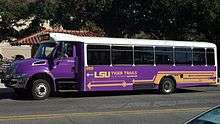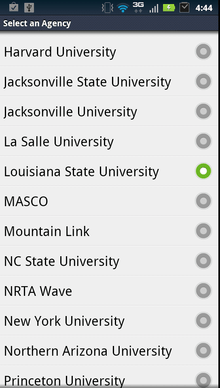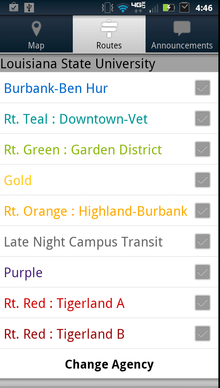LSU Tiger Trails
 | |
| Slogan | The LSU Transit System |
|---|---|
| Founded | 2009 |
| Headquarters | Baton Rouge, Louisiana |
| Locale | Louisiana State University |
| Service area | LSU Campus & Surrounding LSU Community |
| Routes | 15 |
| Fleet | 23 |
| Operator | First Transit |
| Website | https://sites01.lsu.edu/wp/tigertrails/ |




LSU Tiger Trails is the alternative transportation system providing bus service for students, faculty, staff and visitors, both on and off the campus of Louisiana State University.[1] The LSU transit system is operated by First Transit, under contract with LSU's Office of Parking & Transportation Services, formerly known as the Office of Parking, Traffic & Transportation.[1] There are a total of 23 buses in the Tiger Trails fleet. During daytime operating hours, the transit system is capable of operating up to 18 buses during peak hours with five back-up buses.[2]
History
From 1974 to 2009, Louisiana State University used Baton Rouge's Capital Area Transit System to transport its students, faculty and visitors on and off campus.[2] The motion to create LSU Tiger Trails arose in 2008 due to poor bus service and unfulfilled requirements offered by Baton Rouge's Capital Area Transit System (CATS). The Student Government of LSU, along with the Office of Parking & Transportation Services, received complaints filed against both the service and drivers of CATS.[2] The LSU Student government requested that the university ask CATS to improve their service. After several requests by LSU asking for CATS to improve on their shortcomings, followed by no actions taken by CATS; the university began taking the initial steps of breaking away from the CATS contract and starting their own transit system.
Beginnings
In September 2008, the president and senior consultant of Solstice Transportation Consulting, Mitch Skyer came to meet with "Gary Graham, director of the Office of Parking, Traffic & Transportation [sic]," along "with administration, Student Government, transportation officials and passenger representatives" to initiate contact and being to evaluate the transit system.[3] The Solstice Transportation Group held public forums, generated questionnaires, and researched the surrounding area of LSU for population of the LSU community.[2] With the findings of the Solstice Transportation Group, they then mapped projections of routes which the buses should take to maximize usage and reduce route completion time.[2] Solstice Transportation Group presented their projections to the committee in charge of deciding the matter, and the committee was in favor of the outcome of Solstice's projections.[2] LSU put the projections of their new system up for bid to multiple transportation companies.[2] Out of the several companies who submitted their own proposals, First Transit won the bid because they were well priced and responsible.[2]
Before Tiger Trails became 'Tiger Trails,' the LSU student body, facility and staff voted on an appropriate name. The top three most popular names were Tiger Trails, Easy Tiger, and Geaux Tiger, respectively.[4] Tiger Trails took the majority of the vote with 47.3 percent, followed by Easy Tiger commanding 33.4 percent and Geaux Tiger with 19.3 percent.[4]
Current fleet
There are two types of buses in the fleet. The majority of the fleet consists of the 'Eldorado' buses; these are the bigger of the two with flat fronts. The other type is the 'International' which is much like a modern version of the old grade school buses widely used across America. The Eldorado's cost roughly $300,000 and the International costs nearly half that at $150,000.[2]
TransLōc
Every Tiger Trail's bus is equipped with a Global Positioning System (GPS) device, controlled and maintained by TransLoc Inc., that gives Louisiana State University's transit users a helping hand. TransLoc: Transit Visualization System is a company that allows users to see the real-time arrival information of a bus while it is on route. The TransLōc system made its debut on August 1, 2009. The Student Government at the time made it known that this was a critical part of the new transit system.[2] Up to the minute announcements about situations that impact buses can also be viewed. TransLōc offers the real-time data over three different mediums: their website, each specific for any one of the Universities they support, such as LSU TransLoc. The necessary information can also be found on their TransLōc app, which is available for BlackBerry, iPhone, and Android users. The GPS of TransLōc also serves as a helpful tool for the Office of Parking & Transportation Services of LSU. With real-time information on each bus, LSU has the ability to time each bus on its route and make corrections on their routes.
References
- 1 2 "LSU Tiger Trails". LSU Office of Parking, Traffic & Transportation. Retrieved 2011-10-09.
- 1 2 3 4 5 6 7 8 9 10 Graham, Gary (2011-10-07). (Interview). Interview with Andrew Lissy. Baton Rouge: Director of the Office of Parking, Traffic & Transportation (LSU). Missing or empty
|title=(help) - ↑ Kennedy, Katie (18 September 2008). "Bus consultant to arrive Wednesday: Skyer plans five days to evaluate system". The Daily Reveille. Retrieved 14 September 2011.
- 1 2 Schwelm, Andy (14 July 2009). "Students vote to name new system 'Tiger Trails'". The Daily Reveille. Retrieved 2 November 2011.